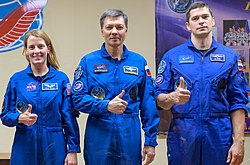 Soyuz MS-24 approaching the ISS Soyuz MS-24 approaching the ISS | |
| Names | ISS 70S |
|---|---|
| Mission type | ISS crew transport |
| Operator | Roscosmos |
| COSPAR ID | 2023-143A |
| SATCAT no. | 57862 |
| Mission duration | 203 days, 15 hours, 33 minutes and 12 seconds |
| Spacecraft properties | |
| Spacecraft | Soyuz MS-25 No. 755 |
| Spacecraft type | Soyuz MS |
| Manufacturer | Energia |
| Crew | |
| Crew size | 3 |
| Members | Loral O'Hara |
| Launching | |
| Landing | |
| Callsign | Antares |
| Start of mission | |
| Launch date | 15 September 2023, 15:44:35 (15 September 2023, 15:44:35) UTC |
| Rocket | Soyuz-2.1a |
| Launch site | Baikonur, Site 31/6 |
| Contractor | RKTs Progress |
| End of mission | |
| Landing date | 6 April 2024, 07:17:47 (6 April 2024, 07:17:47) UTC |
| Landing site | Kazakh Steppe, Kazakhstan (47°25′6.12″N 69°38′56.22″E / 47.4183667°N 69.6489500°E / 47.4183667; 69.6489500) |
| Orbital parameters | |
| Reference system | Geocentric orbit |
| Regime | Low Earth orbit |
| Inclination | 51.659° |
| Docking with ISS | |
| Docking port | Rassvet nadir |
| Docking date | 15 September 2023, 18:53:32 UTC |
| Undocking date | 6 April 2024, 03:54:58 UTC |
| Time docked | 203 days, 9 hours, 1 minute and 26 seconds |
  Mission patches: launch (left) and landing (right)   Top: launching crew, from left: O'Hara, Kononenko, and Chub Bottom: landing crew, from left: O'Hara, Novitsky, and VasilevskayaSoyuz programme (crewed)← Soyuz MS-23Soyuz MS-25 → | |
Soyuz MS-24, Russian production No. 755 and identified by NASA as Soyuz 70S, was a Russian crewed Soyuz spaceflight launched from Baikonur on 15 September 2023 to the International Space Station.
Crew
They were originally assigned to Soyuz MS-23, but they were moved to MS-24 due to a coolant leak on Soyuz MS-22 that required MS-23 to be launched uncrewed as its replacement and returned to Earth uncrewed. Oleg Kononenko was assigned for a one year long mission with his MS-24 crewmate Nikolai Chub that started on September 15, 2023. As the mission lasted 374 days, Kononenko spent a total of 1,111 days in space. He exceeded the previous record of 878 days held by Gennady Padalka on 4 February 2024. He later became the first person to stay 900, 1,000, and 1,110 days in space on 25 February 2024, 4 June 2024, and 12 September 2024 respectively.
| Position | Launching crew member | Landing crew member |
|---|---|---|
| Commander | Expedition 69/70/71 Fifth spaceflight |
21st Visiting Expedition Fourth spaceflight |
| Flight Engineer/ Spaceflight Participant | Expedition 69/70/71 First spaceflight |
21st Visiting Expedition First spaceflight |
| Flight Engineer | Expedition 69/70 First spaceflight | |
| Position | Crew member | |
|---|---|---|
| Commander | ||
| Flight Engineer | ||
Undocking and Return
At the end of Expedition 70, O'Hara returned to Earth on Soyuz MS-24 with Roscosmos cosmonaut Oleg Novitsky and Belarusian spaceflight participant Marina Vasilevskaya (both on ISS EP-21) on 6 April 2024. On the other hand, Kononenko and Chub remained onboard the ISS for a year and returned to Earth with NASA astronaut Tracy Caldwell-Dyson on Soyuz MS-25. As the mission lasted 374 days, Kononenko spent a total of 1,111 days in space by the time he returned to Earth. He broke the world record of 878 days in space held by Gennady Padalka on February 4, 2024 at 07:30:08 UTC. He later became the first person to stay 900, 1,000, and 1,100 days in space on 25 February 2024, 4 June 2024, and 12 September 2024 respectively.
References
- Zak, Anatoly (13 February 2023). "Space exploration in 2023". RussianSpaceWeb. Retrieved 16 February 2023.
- "Belarusian female astronaut to go ISS in March 2024 — Roscosmos". TASS. Retrieved 30 May 2023.
- Imgur. "imgur.com". Imgur. Retrieved 13 August 2022.
- "Russian cosmonaut sets new record for most total time in space — more than 878 days". ABC. 4 February 2024. Archived from the original on 4 February 2024. Retrieved 4 February 2024.
| People currently in low Earth orbit | |||||
|---|---|---|---|---|---|
| International Space Station (Expedition 72) |
| ||||
| Tiangong space station (Expedition 8) |
| ||||
| Soyuz programme | |||||||||||||||||||||||||||
|---|---|---|---|---|---|---|---|---|---|---|---|---|---|---|---|---|---|---|---|---|---|---|---|---|---|---|---|
| Main topics |  | ||||||||||||||||||||||||||
| Past missions (by spacecraft type) |
| ||||||||||||||||||||||||||
| Current missions | |||||||||||||||||||||||||||
| Future missions | |||||||||||||||||||||||||||
| Uncrewed missions are designated as Kosmos instead of Soyuz; exceptions are noted "(uncrewed)". The † sign designates failed missions. Italics designates cancelled missions. | |||||||||||||||||||||||||||
| Human spaceflights to the International Space Station | ||
|---|---|---|
| See also: ISS expeditions, Uncrewed ISS flights | ||
| 1998–2004 |
|  |
| 2005–2009 | ||
| 2010–2014 | ||
| 2015–2019 |
| |
| Since 2020 |
| |
| Future | ||
| Individuals | ||
| Vehicles |
| |
| ||